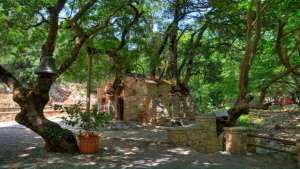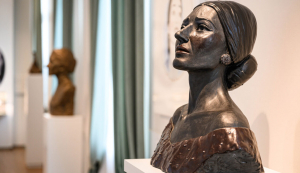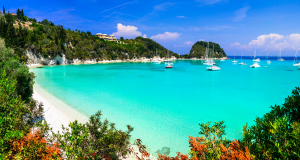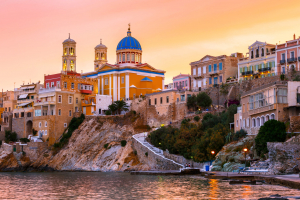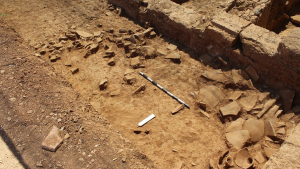ABOUT US
XpatAthens
Sunday, 04 February 2024 07:00
Kremmydia: The Only Greek Village In The Guinness World Records
Nestled within the picturesque landscapes of Messinia, Greece, lies the unsuspecting village of Kremmydia—its charm extending beyond the scenic beauty that surrounds it. Positioned less than 20 kilometers from Pylos, specifically in Pylia, this gem unveils a unique distinction that has etched its name into the prestigious Guinness Book of Records.
For those exploring the region from the vibrant city of Kalamata, Kremmydia is a captivating stopover, known by alternate names like Fourtzokermyda, Velanidia, or Fourtzi. Contrary to any assumptions related to its name, the village's claim to fame in the Guinness Book of Records is not linked to onions or agricultural feats.
In 1999, Kremmydia earned its place in history by boasting the largest percentage of graduate scientists among its residents, a remarkable 30% of the population. The accolade reflects the village's commitment to education and intellectual pursuits, a legacy dating back to 1893, when the village's school first commenced its operations. The remarkable journey from its educational roots to the record-breaking feat saw a total of 810 graduates emerge as scholars and scientists.
Steeped in ancient history, Kremmydia's roots trace back to Nestor's kingdom in ancient Pylos. The current settlement, a fusion of three older settlements—Fourtzi or Frutzi (later Velanidies or Velanidia since 1927), Ano Kremmydia, and Kato Kremmydia—holds historical significance. Kremmydi, the oldest of the settlements, has been documented since the Venetian occupation, while the others date back to at least the foundation of the Greek State.
Beyond its intellectual prowess, Kremmydia echoes the battles fought on its soil. On April 7, 1825, the village witnessed a historic clash between Ibrahim's troops, fresh invaders of the Peloponnese, and Greek rebels led by Kyriakos Skourtis from Hydra. The fierce engagement involved around 3,400 Egyptians and 3,250 Greeks, culminating in a challenging retreat for the Greeks after losing approximately 600 men.
Kremmydia, a village that combines intellect, history, and natural beauty, invites travelers to explore its layers of significance—a journey through time and achievement in the heart of Messinia.
Originally published in Greek on: mixanitouxronou.gr
Translated by: Codico Lab
Originally published in Greek on: mixanitouxronou.gr
Translated by: Codico Lab
Published in
Greece In The News
Tagged under
Monday, 05 February 2024 07:00
February Fun & Opera Adventures At The Maria Callas Museum
Discover the captivating world of Maria Callas at the first-ever museum dedicated to the iconic soprano, a true benchmark for 20th-century opera. This February, the Maria Callas Museum of the Municipality of Athens is inviting enthusiasts of all ages to get acquainted with the life and artistry of this legendary diva.
Museum Program Highlights for February:
1. Free Guided Tours for Seniors 65+
- Every Thursday in February and March at 11:00 a.m.
- A unique opportunity for visitors aged 65 and above to explore the museum's treasures with complimentary guided tours included in the ticket price.
- Plan your visit: Duration: 50 minutes; Entrance: 7 euros for 65+; Tour: free. Limited seats; early arrival is recommended.
2. Movie Screening: "Callas Forever" (2002)
- Sunday, February 18 at 18:00.
- In collaboration with the Italian Educational Institute, enjoy the film directed by Franco Zeffirelli, with Italian dialogue and Greek subtitles.
- General Admission: €10/person. Duration: 1h 45m. Combine your museum visit with the film for a comprehensive experience.
3. Family Workshops on Saturdays
- "Sets and Stories" on February 17, ages 8 to 12, from 10:30 to 11:30 am.
- Children and chaperones get creative with a workshop inspired by museum exhibits and opera stories, becoming set designers and bringing their imaginative worlds to life.
- Theatrical workshop. Limited to 20 children. Participation: 8 euros per child with a museum ticket or companion. A phone reservation is required.
4. Creative Narratives: "Fourfouris 1: Music"
- Saturday, February 17, for ages 3-5, from 3:00 to 4:00 pm.
- A storytelling session with theatrical, musical-motor games, and visual activities for children accompanied by their guardians.
- Participation: 7 euros per child with museum entrance or companion. A phone reservation is needed up to 10 days before the workshop.
Booking Details:
- To plan your visit and reserve your spot, call 210-44-04 204.
- For online bookings, please click here!
Note: Limited tickets are available; book in advance to secure your spot. For in-person ticket purchases, visit the Maria Callas Museum box office. Telephone reservations are accepted from Tuesday to Friday, 11:00–16:00.
Published in
Local News
Tagged under
Thursday, 01 February 2024 12:35
Recent Movies & TV Shows You Didn't Know Were Filmed In Greece
Welcome to a cinematic odyssey through the sun-kissed landscapes of Greece, where the azure waters, ancient ruins, and charming villages have become the enchanting backdrop for an increasing number of movies and captivating TV shows. As Hollywood and international filmmakers have discovered the allure of Greece's diverse and picturesque locales, the country has emerged as a prominent and sought-after filming destination.
Here are some recent films and TV shows filmed in Greece that are worth watching!
1. Glass Onion: A Knives Out Mystery

📍Spetses, Greece. Credit: @billakosssss
In this 2022 movie, the world-renowned detective Benoit Blanc unravels a gripping mystery set against the stunning backdrop of Greece. This mystery film, sprinkled with humor, will keep you guessing from beginning to end. The crisp and picturesque Greek imagery adds an extra layer of allure to the story. Filmed on Spetses in 2021, the adventure begins in this captivating island before transitioning to the enchanting Amanzoe's Villa 20 in Porto Heli. The shift in locations brings a dynamic element to the film, contributing to its visual richness and showcasing the diverse beauty that Greece has to offer. Director Rian Johnson described the experience as "a summer vacation where we also made a movie," capturing the essence of the unique filming journey.
2. Daisy Jones & The Six

📍Hydra, Greece. Credit: @lesbisousrouges
This American musical drama television miniseries, adapted from the 2019 novel, starts unfolding its compelling narrative in the year 1977. This drama, blending romance and music, takes you on a journey across three vivid locations: the vibrant streets of Los Angeles, the soulful atmosphere of New Orleans, and the enchanting landscapes of Greece. Following the completion of the album and the realization of genuine emotions for Billy, Daisy makes a bold move, hightailing it to Greece, specifically the picturesque island of Hydra.

📍Hydra, Greece. Credit: @lesbisousrouges
This American musical drama television miniseries, adapted from the 2019 novel, starts unfolding its compelling narrative in the year 1977. This drama, blending romance and music, takes you on a journey across three vivid locations: the vibrant streets of Los Angeles, the soulful atmosphere of New Orleans, and the enchanting landscapes of Greece. Following the completion of the album and the realization of genuine emotions for Billy, Daisy makes a bold move, hightailing it to Greece, specifically the picturesque island of Hydra.
3. Maestro in Blue

📍Paxoi, Greece. Credit: @nick.haji

📍Paxoi, Greece. Credit: @nick.haji
This show made history as the first Greek series to grace Netflix, whisking viewers away to the charming and petite Greek island of Paxos. Nestled between the islands of Corfu and Lefkada, Paxos becomes the picturesque canvas for this groundbreaking series. As the plot unfolds, the storyline takes us on several visits to the nearby island of Corfu. During the pandemic, a musician embarks on a journey to set up a music festival, inadvertently finding love and becoming entangled in other people's lives. This gripping drama delves into modern-world problems, keeping audiences on their toes with a rollercoaster of powerful and harsh moments with many twists. However, what truly distinguishes "Maestro in Blue" is the breathtaking imagery—the crystal-clear waters of Paxoi and landscapes that are nothing short of cinematic perfection.
4. The Triangle of Sadness

📍Chiliadou Beach, Euboea. Credit: Greg Patrikios

📍Chiliadou Beach, Euboea. Credit: Greg Patrikios
This movie unfolds as a satirical black comedy, delving into the complexities of class disparity through a power play involving a supermodel couple and a disruptive shipwreck. The film skillfully explores the absurdity of a social hierarchy challenged by a lack of survival skills among the affluent islanders. Shot against the backdrop of both Sweden and the jaw-dropping landscapes of Greece, the Greek locations steal the spotlight with their breathtaking beauty. The beach scenes, filmed at Chiliadou Beach on the island of Euboea, elevate the film's visual appeal, seamlessly blending biting satire with the sheer magnificence of the Greek landscape.
5. A Perfect Story

📍Mykonos, Greece. Credit: @minogiannisvalantis

📍Mykonos, Greece. Credit: @minogiannisvalantis
When Margot makes a daring escape from her own wedding, she's left adrift, searching for purpose. Little does she realize that David, with his delightful chaos, holds the key to finding her way. Adapted from Elísabet Benavent's 2020 novel 'Un cuento perfecto,' this tale weaves a classic narrative of two lovers from vastly different worlds. The magic of 'A Perfect Story' unfolds against the captivating backdrops of both Greece and Madrid. Notably, the popular Greek island of Mykonos takes center stage, becoming a visual feast for audiences. Renowned for its white and blue landscapes, Mykonos adds a touch of enchantment to the Netflix limited series, as confirmed by tourism consulting firm MTC. 'A Perfect Story' is a visual journey that brings to life the beauty of Greece and the allure of a tale as old as time.
6. How To Have Sex

📍Malia, Crete. Credit: @jess.thoe
This upcoming coming-of-age drama follows three British teenage girls on a rites-of-passage holiday in the lively party town of Malia, Crete. As they embrace the thrill of drinking and clubbing, anticipating the best summer of their lives, the narrative takes a powerful twist when the party unexpectedly grinds to a halt. Filmed against the vibrant backdrop of Malia, known for its energetic atmosphere and bustling nightlife, the movie weaves a compelling story, tapping into the profound theme of consent. Malia's lively streets and dynamic ambiance not only set the stage for the characters' adventures but also enhance the film's immersive portrayal of youth and the complexities of their experiences, promising an emotionally charged cinematic journey.

📍Malia, Crete. Credit: @jess.thoe
This upcoming coming-of-age drama follows three British teenage girls on a rites-of-passage holiday in the lively party town of Malia, Crete. As they embrace the thrill of drinking and clubbing, anticipating the best summer of their lives, the narrative takes a powerful twist when the party unexpectedly grinds to a halt. Filmed against the vibrant backdrop of Malia, known for its energetic atmosphere and bustling nightlife, the movie weaves a compelling story, tapping into the profound theme of consent. Malia's lively streets and dynamic ambiance not only set the stage for the characters' adventures but also enhance the film's immersive portrayal of youth and the complexities of their experiences, promising an emotionally charged cinematic journey.
Published in
Greece In The News
Tagged under
Thursday, 01 February 2024 07:00
Things That Only Make Sense In Greece
Greece, a country brimming with history, has a cultural tapestry woven with unique threads that make it distinctly Greek. From the azure waters of the Aegean to the lively streets of Athens, there's a charm and character that are unparalleled.
So, what are we waiting for? Let's delve into the quirks and traditions that define the Greek way of life—the things that make perfect sense only in this land of gods, olives, and feta!
1. Kefi (Κέφι):
So, what are we waiting for? Let's delve into the quirks and traditions that define the Greek way of life—the things that make perfect sense only in this land of gods, olives, and feta!
1. Kefi (Κέφι):
Kefi is one of those the untranslatable Greek words and it means the unique sense of joy, passion, and zest for life that is deeply embedded in Greek culture. It's that magical feeling you get when dancing to bouzouki music or enjoying a lively gathering with friends and family.
2. Coffee Culture:
In Greece, coffee is not just a drink; it's a social ritual. From the strong and small Greek coffee to the leisurely frappé, coffee breaks are sacred, fostering connection and conversation.
3. Philoxenia (Φιλοξενία):
Philoxenia, or the love of strangers, is a cultural cornerstone. Greeks take immense pride in their hospitality, welcoming guests with open arms and treating them like family.
4. Blue and White Everywhere:
The classic combination of blue and white is not just a color scheme in Greece; it's an identity. From the flag to the iconic blue-domed churches of Santorini, these colors symbolize the beauty of the Greek landscape.
5. Worry Beads (Κομπολόι):
The constant clicking of worry beads is a common sight in Greece. Used as a stress-reliever or a thoughtful accessory, the komboloi reflects the laid-back attitude of the Greeks.
6. Siesta Time:
The cherished afternoon siesta is more than just a nap; it's a way of life. The midday break allows for a pause in the hustle and bustle, ensuring that work doesn't overshadow the importance of relaxation.
7. Feta on Everything:
Feta cheese is a Greek kitchen staple, finding its way onto salads, pastries, and even desserts. Its crumbly texture and tangy taste are a testament to the versatility of Greek cuisine.
8. Waving with an Open Palm:
In Greece, waving with an open palm is a sign of friendship and goodwill. It's a simple yet meaningful gesture that conveys warmth and sincerity.
9. Telling Time in "Greek Time":
"Greek time" is a relaxed approach to punctuality. It's not uncommon for social events to start later than planned, as Greeks appreciate the importance of savoring the moment.
10. Church Bells Symphony:
The sound of church bells ringing is a constant background melody in Greece. It marks religious ceremonies, weddings, and funerals, creating a timeless connection to the divine.
11. Traffic Laws as Mere Suggestions:
Navigating Greek roads requires a blend of skill and patience, as traffic laws sometimes seem more like friendly suggestions. The chaos somehow results in a unique harmony.
12. Naming Days, Not Just Birthdays:
In addition to celebrating birthdays, Greeks also commemorate name days, feast days of saints associated with their names. It adds an extra layer of festivity to the calendar.
Published in
Greek Language & Culture
Tagged under
Wednesday, 31 January 2024 14:03
Greece Among Top 5 Countries for Expat Retirement
CEOWORLD magazine has placed Greece in the Top 5 countries for expat retirement in 2024 after releasing the “Global Expat Retirement Index 2024 Survey," a guide listing the countries that offer the most stability for those thinking of retiring abroad.
A leading business magazine for CEOs, CFOs, high-level executive professionals, business leaders, and high-net-worth individuals, CEOWORLD assessed each country based on local friendliness, health, and well-being, quality of life, ease of settling in, recreation, culture, nightlife, and diverse culinary options.
Greece ranked 5th on a list of 50 countries with a score of 95.07.
Preceding Greece on the list were Taiwan in first place with a score of 95.67, followed by Spain (95.31), Portugal (95.29), and Mexico (95.2). Completing the Top 10 list after Greece were the United Arab Emirates, France, Thailand, Indonesia, and Vietnam.
Earlier this month, Greece was once again listed among the Top 10 Best Places in the World to Retire in 2024, according to the 2024 Global Retirement Index released by International Living.
The country ranked 7th with an overall score of 77 and was described as a “dream vacation destination.”.
To read this article in full, please visit: keeptalkinggreece.com
To read this article in full, please visit: keeptalkinggreece.com
Published in
Greece In The News
Tagged under
Wednesday, 31 January 2024 13:49
Empowering Hearts: A Guide to Cultivating Children's Emotional Intelligence
Envision a world where our children not only excel academically but also possess the invaluable ability to comprehend, manage, and connect with their emotions and those of others. This is not an unattainable dream; it rests within our grasp. In our rapidly evolving society, emotional intelligence has emerged as a pivotal skill for personal and professional success. The question then becomes: How do we instill and nurture emotional intelligence in our children?
Understanding Emotional Intelligence: Psychologist Daniel Goleman defines emotional intelligence through four basic skills:
- Self-awareness: Recognizing and understanding one's emotions and their impact on thoughts and behaviors.
- Self-regulation: Managing and controlling emotional reactions, including anger, frustration, and anxiety.
- Empathy: Understanding the feelings of others, encompassing both recognition and responsive engagement.
- Social skills: Facilitating effective communication, cooperation, and the establishment of healthy relationships.
Cultivating Self-awareness:
- Encourage emotional expression: Foster an environment where a child can express feelings without fear, demonstrating that it's acceptable to experience a range of emotions.
- Label feelings: Teach the child to articulate their emotions, aiding in a better understanding of their emotional state.
- Encourage introspection: Prompt the child to reflect on their feelings and triggers, fostering an association between emotions and specific situations.
Promoting Self-regulation:
- Relaxation Techniques: Introduce simple techniques like deep breathing and counting to ten to empower the child to manage emotions effectively.
- Self-Regulatory Model: Lead by example, demonstrating self-control in your emotional reactions to provide a tangible model for the child.
- Set limits: Establish clear rules and emphasize consequences, highlighting the significance of self-regulation.
Cultivating Empathy:
- Active Listening: Teach the child to actively listen, show interest in others' feelings, and ask questions to comprehend their emotional state.
- Embrace diversity: Encourage participation in activities that expose the child to diverse backgrounds, fostering empathy and understanding.
- Read and discuss books: Select literature that explores different characters and emotions, using stories as a platform to discuss empathy.
Building Social Skills:
- Encourage cooperation: Promote teamwork to teach children cooperation and conflict resolution.
- Role play: Facilitate social interaction practice through role-playing scenarios.
- Offer guidance: Provide advice on appropriate social behaviors such as sharing feelings, taking turns, and resolving conflicts peacefully.
Cultivating emotional intelligence in children is a crucial responsibility for parents and caregivers. By comprehending the psychological components of emotional intelligence and implementing these practical strategies, we empower our children to navigate the complexities of their emotional worlds. As they mature, these skills become assets not only in personal realms but also in education, careers, and relationships.
In a world where emotional intelligence is as highly valued as academic achievement, our children are positioned to thrive and make a positive impact. As parents and caregivers, we play a fundamental role in shaping their emotional landscapes and preparing them for future challenges and opportunities. The journey of cultivating emotional intelligence is not only exciting but also deeply rewarding, endowing our children with a lifelong skill that fosters empathy, resilience, and prosperity.
Originally published in Greek on: loveyourselfmagazine.com

Love Yourself is a comprehensive Greek media platform dedicated to embracing mindstyle as its fundamental essence. It advocates for a wholesome lifestyle that nurtures not only our soul, mind, and body but also promotes a positive and sustainable attitude towards the planet we call home. For more information, visit Love Yourself's website!
Originally published in Greek on: loveyourselfmagazine.com

Love Yourself is a comprehensive Greek media platform dedicated to embracing mindstyle as its fundamental essence. It advocates for a wholesome lifestyle that nurtures not only our soul, mind, and body but also promotes a positive and sustainable attitude towards the planet we call home. For more information, visit Love Yourself's website!
Published in
Parenting
Tagged under
Tuesday, 30 January 2024 14:33
10 English Words You Didn't Know Had Greek Origins
Language is an ever-evolving entity, perpetually shaped by diverse influences and borrowing from the rich tapestry of human history. English, as a melting pot of linguistic influences, serves as a vibrant testament to this dynamic process. Among the numerous languages contributing to its lexicon, Greek stands out as a venerable source, its roots extending deep into the corridors of antiquity.
The Greek language stands as one of the oldest and most influential linguistic sources in history. Its enduring legacy has not only shaped the cultural and philosophical landscape but has also gifted the world with a myriad of words. From everyday vocabulary to scientific terminology, the Greek language has left an indelible mark on the way we communicate.
Let's take a look at 10 common English words you may not know are of Greek origin!
Museum: The word "museum" comes from the Greek "Mouseion," which referred to a temple or a place dedicated to the Muses, the goddesses of the arts and sciences in Greek mythology. Museums, as we know them today, are institutions that house and display artistic, historical, and scientific artifacts.
Cynic: When you describe someone as cynical, you're tapping into the Greek philosophy of the Cynics. "Kynikos" in Greek means "dog-like," and the Cynics were followers of an ancient philosophical school that believed in living a simple, virtuous life in accordance with nature.
Panic: The term "panic" has its origins in Greek mythology. Pan, the Greek god of the wild, was believed to instill sudden fear in travelers in isolated areas. The intense, sudden fear associated with Pan's presence gave rise to the word "panic" in English.
Chaos: In Greek mythology, Chaos refers to the formless, shapeless void that existed before the creation of the universe. The English word "chaos" adopted this concept to describe a state of utter confusion or disorder.
Aesthetic: When we talk about aesthetic appreciation, we are drawing on the Greek word "aisthesis," which means "perception" or "sensation." Aesthetics involves the study of beauty and artistic principles.
Therapy: Derived from the Greek word "therapeia," meaning healing or medical treatment, "therapy" in English refers to the treatment of a physical or mental ailment through various methods, emphasizing the healing aspect.
Elixir: From the Greek word "xērion," meaning powder for drying wounds, "elixir" in English refers to a magical or medicinal potion believed to have the power to prolong life.
Problem: The word "problem" comes from the Greek word "problema," which means a task, a question, or a puzzle. In ancient Greece, a problem was a mathematical proposition for consideration.
Tomb: The English word "tomb" has its roots in the Greek word "tymbos" and the Latin word "tumulus," both referring to a burial mound or a grave. Over time, the term evolved into its current usage to describe a place for the dead, often marked by a monument or structure.
Priest: The term "priest" comes from the Old English word "preost," which is ultimately derived from the Latin "presbyter" and the Greek "presbyteros." In the Christian context, it refers to an elder or a minister of a Christian church.
Published in
Greek Language & Culture
Tagged under
Monday, 29 January 2024 07:00
Ermoupolis Is The Second Most Welcoming City In The World According To Booking.com
Booking.com, a renowned global booking platform, has recently unveiled its esteemed Traveler Review Awards 2024, showcasing the world's most welcoming destinations. From charming coastal retreats to serene mountain havens, these places have earned their spots through a remarkable display of hospitality, as evidenced by a staggering 309 million valid reviews from Booking.com travelers.
In a testament to its exceptional hospitality, Ermoupolis of Syros has secured the second position in this year's list of the world's 10 most hospitable cities. This capital city is a masterpiece in itself, adorned with beautiful neoclassical structures, the grand City Hall in Miaouli Square designed by Ernesto Ziller, and the historic Municipal Theater of Apollo, crafted in 1864 by the skilled hands of Italian architect Pietro Sambo. The cityscape is akin to an open-air museum, featuring mansions along the waves in the aristocratic Vaporia district, the iconic church of Agios Nikolaos with its characteristic blue dome, and other splendid Orthodox and Catholic churches.
Awards Criteria
It's essential to note that destinations are ranked based on the total number of Traveler Review Award 2024 recipients. These prestigious awards are derived from an extensive pool of over 309 million verified reviews, recognizing businesses that consistently deliver excellent service and unwavering hospitality.
Continued Excellence: Italy Dominates
For the seventh consecutive year, Italy stands out with the highest number of awardees, boasting an impressive total of 181,012 awards. Following closely are Spain (125,611), France (124,361), Germany (86,910), and the United Kingdom (74,754), showcasing the unwavering commitment to exceptional service across these European nations.
The World's Most Welcoming Destinations
Now, let's dive into the lists of the most welcoming destinations around the globe, according to this year's prestigious Booking.com awards:
The 10 Most Welcoming Cities:
- Arraial d'Ajuda, Brazil
- Ermoupolis, Greece
- Viana do Castelo, Portugal
- Daylesford, Australia
- Grindelwald, Switzerland
- Moab, United States
- Uzes, France
- Mazatlan, Mexico
- Jaisalmer, India
- Fujikawaguchiko, Japan
The 10 Most Welcoming Regions:
-
Perthshire, United Kingdom
-
Penghu, Taiwan
-
Boyaca, Colombia
-
Trentino-Alto Adige, Italy
-
Los Lagos, Chile
-
Erongo, Namibia
-
Otago, New Zealand
-
Lapland, Finland
-
Asturias, Spain
-
Friesland, Netherlands
Originally published in Greek on: syrostoday.gr
Translated by: Codico Lab
Published in
Greece In The News
Tagged under
Friday, 26 January 2024 09:07
How To Become A Successful Digital Nomad In Greece
Greece, with its rich history, stunning landscapes, and warm Mediterranean climate, has become an increasingly popular destination for digital nomads seeking a blend of work and adventure. However, before embarking on your journey to this captivating country, it's crucial to take several factors into account.
Here's what to consider when contemplating Greece as your next digital nomad and remote working destination:
Here's what to consider when contemplating Greece as your next digital nomad and remote working destination:
1. Choose The Right Location
Greece offers a diverse range of locations for digital nomads. Consider popular destinations like Athens, Thessaloniki, or big islands such as Crete, Santorini, or Corfu. Each place has its own unique charm, cultural experiences, and connectivity options. Assess your preferences and needs to find the perfect spot that aligns with your work and lifestyle.
2. Secure A Reliable Internet Connection
As a digital nomad, a stable internet connection is paramount. Ensure your chosen accommodation provides high-speed and reliable Wi-Fi. Consider having a backup option, like a local SIM card with a data plan, in case of any disruptions.
As a digital nomad, a stable internet connection is paramount. Ensure your chosen accommodation provides high-speed and reliable Wi-Fi. Consider having a backup option, like a local SIM card with a data plan, in case of any disruptions.
3. Explore Co-Working Spaces
Greece has seen a rise in co-working spaces catering to the growing number of digital nomads. These spaces offer a professional work environment, networking opportunities, and essential amenities. Popular co-working hubs include The Cube Athens and Stone Soup in Athens, providing a vibrant community for remote workers.
Greece has seen a rise in co-working spaces catering to the growing number of digital nomads. These spaces offer a professional work environment, networking opportunities, and essential amenities. Popular co-working hubs include The Cube Athens and Stone Soup in Athens, providing a vibrant community for remote workers.
4. Understand The Visa Regulations
Before embarking on your digital nomad journey to Greece, familiarize yourself with the visa regulations. Introduced in 2021, the Digital Nomad Visa for Greece allows people who are not citizens of the European Union or European Economic Area and who work remotely to legally live and work in Greece for up to one year. It also allows you to bring your immediate family members with you, as long as you meet all the requirements.
5. Embrace the Greek Lifestyle
One of the joys of being a digital nomad in Greece is familiarising yourself with the local culture. Enjoy the delectable Mediterranean cuisine, explore ancient ruins, and participate in traditional festivals. Balancing work with leisure will enrich your experience and contribute to your overall well-being.
6. Network Locally
Build connections with fellow digital nomads and locals alike. Attend meetups, networking events, or join online communities to exchange insights and tips and perhaps collaborate on projects. Building a supportive network can enhance your professional and personal life while living in Greece.
7. Manage Time Zones Effectively
Working as a digital nomad often involves dealing with clients or teams in different time zones. Plan your work schedule to accommodate any time differences, and communicate transparently with your clients or colleagues to manage expectations.
8. Stay Active and Healthy
The Greek outdoors offer ample opportunities for physical activities. Balance your sedentary work hours with exploration and exercise. Hike the mountains, swim in the crystal-clear waters, or practice yoga on the beach—maintaining a healthy lifestyle is key to a successful and fulfilling digital nomad experience.
Becoming a successful digital nomad in Greece involves a thoughtful blend of work, exploration, and cultural immersion. With reliable internet, a welcoming community, and the beauty of the Greek landscape, your journey can be both professionally rewarding and personally enriching. So, pack your bags, set up your remote office, and let Greece be the backdrop to your digital nomad adventure!
Published in
Tips & Advice
Tagged under
Thursday, 25 January 2024 07:00
Roman-Era Wine Shop Discovered In Greece
Archaeologists in Greece discovered a 1,600-year-old Roman-era wine shop that met its end due to a sudden event, possibly an earthquake or building collapse. The findings include broken vessels and sixty scattered coins, offering a glimpse into the past.
This ancient shop was active during the time when the Roman Empire had control over the region. The site of this discovery is the ancient city of Sikyon (Sicyon), situated on the northern coast of the Peloponnese in southern Greece.
As experts explored the wine shop, they unearthed not just coins but also bits of marble tabletops and various vessels crafted from bronze, glass, and ceramic, reported Live Science.
Unclear about types of wine
In a recent presentation at the annual meeting of the Archaeological Institute of America in Chicago, archaeologists revealed that the wine shop was situated on the northern part of a larger complex.
This complex housed several workshops equipped with kilns and installations specifically designed for pressing grapes or olives.
Scott Gallimore, an associate professor of archaeology at Wilfrid Laurier University in Canada, and Martin Wells, an associate professor of classics at Austin College, explained via email that there is no direct evidence about the specific types of wine sold at the shop.
Although they found grape pips (Vitis vinifera), the researchers are unable to provide more detailed information at this time.
Apart from wine, the shop might have also traded in other goods, such as olive oil. Scott Gallimore said the majority of the coins discovered belong to the era of Constantius II, spanning from 337 to 361. The most recent coin in the collection was minted sometime between 355 and 361, as revealed in a Live Science email.
Destruction as a result of an earthquake or roof collapse
The wine shop, according to Scott Gallimore, seems to have experienced a “sudden event” leading to its destruction and abandonment. The sixty bronze coins discovered on the floor date back to the final moments of the shop.
The coins were all scattered about on the floor of the shop. This suggests they were kept together, possibly in a ceramic container or some sort of bag. When the shop was destroyed, it seems the container fell to the floor, as did the coins, Gallimore explained.
There is currently uncertainty about the nature of the event. The destruction could have been caused by an earthquake or a possible roof collapse caused by environmental factors, such as excessive rainfall, said Gallimore. Following the destruction, there was debris and sediment all over the place, but no attempt was made to retrieve anything from it.
The larger complex, including the shop, seems to have been deserted in the early fifth century, potentially around the time of the destructive event.
Originally published on: greekreporter.com
Originally published on: greekreporter.com
Photo Credit: Scott Gallimore
Published in
Local News
Tagged under

